Nagpur Junction railway station
Nagpur Junction (station code: NGP) is a railway station in Nagpur, in the Indian state of Maharashtra. It is an important junction station on the Howrah–Mumbai and Delhi–Chennai trunk line of the Indian Railways. It belongs to the A1 category of railway stations and is one of the top 100 stations of the Indian Railways system in terms of total bookings.
नागपुर NAGPUR JN | ||||||||||||||||||||||||||
|---|---|---|---|---|---|---|---|---|---|---|---|---|---|---|---|---|---|---|---|---|---|---|---|---|---|---|
| Express and Passenger train station | ||||||||||||||||||||||||||
 | ||||||||||||||||||||||||||
| General information | ||||||||||||||||||||||||||
| Location | Sitabuldi, Nagpur, Maharashtra | |||||||||||||||||||||||||
| Coordinates | 21.1534°N 79.0889°E | |||||||||||||||||||||||||
| Elevation | 308.660 metres (1,012.66 ft) | |||||||||||||||||||||||||
| Owned by | Indian Railways | |||||||||||||||||||||||||
| Operated by | Central Railway | |||||||||||||||||||||||||
| Line(s) | New Delhi–Chennai main line Howrah–Nagpur–Mumbai line Bhopal–Nagpur section Nagpur–Secunderabad section Bilaspur–Nagpur section Nagpur–Bhusawal section | |||||||||||||||||||||||||
| Platforms | 8 | |||||||||||||||||||||||||
| Tracks | 13 | |||||||||||||||||||||||||
| Connections | ||||||||||||||||||||||||||
| Construction | ||||||||||||||||||||||||||
| Structure type | Standard (on-ground station) | |||||||||||||||||||||||||
| Parking | Yes | |||||||||||||||||||||||||
| Accessible | ||||||||||||||||||||||||||
| Other information | ||||||||||||||||||||||||||
| Status | Functional | |||||||||||||||||||||||||
| Station code | NGP[1] | |||||||||||||||||||||||||
| Zone(s) | Central Railway | |||||||||||||||||||||||||
| Division(s) | Nagpur | |||||||||||||||||||||||||
| History | ||||||||||||||||||||||||||
| Opened | 1867[2] | |||||||||||||||||||||||||
| Electrified | 1988–89 (Ballarshah–Nagpur) 1990–91 (Nagpur–Amla) 1991–92 (Tharsa–Nagpur)[3] | |||||||||||||||||||||||||
| Passengers | ||||||||||||||||||||||||||
| 185,000 daily (approx)[4] | ||||||||||||||||||||||||||
| Services | ||||||||||||||||||||||||||
| ||||||||||||||||||||||||||
| Location | ||||||||||||||||||||||||||
History
Nagpur Junction is one of the oldest and busiest stations in Maharashtra. Railways came to Nagpur in 1867, when a portion of the Bombay-Bhusaval-Nagpur line was opened for traffic.[2] In 1881, it was connected to Kolkata via the Nagpur State Railway of Chhattisgarh.[5][6]
The laying of the foundation stone of the existing building was done in 1906. It was officially inaugurated on 15 January 1925 by then Governor Sir Frank Sly.[6] Before 1924, the original railway station was located towards the east of its current site near Shukrawari Lake. The present-day railway station was also put up in the pre-independence days. It has become a major tourist destination.[7]
Services
Nagpur is the divisional headquarters of two railway zones, Central Railway and South East Central Railway.[8] Nagpur division has GT Route from Itarsi to Ballarshah and Mumbai-Howrah route from Gondia to Badnera. North-South and East-West traffic crisscrosses through the Division, making its Nagpur-Wardha section one of the busiest sections in Indian Railways. It has 3 branch lines connecting Amla-Chhindwara, Narkhed-Amravati & Majri-Pimpalkutti on Broad Gauge and one branch line Pulgaon-Arvi in Narrow Gauge .[2] Shortest run by Indian Railways’ train is the scheduled services between Nagpur and Ajni stations situated just 3 km from each other.
Around 254 Mail/Express and Passenger trains halt at the station,[9] with approximately 185,000 passengers embarking and disembarking.[4] 22 trains originate from and terminate at this station. Direct trains are available for most of the state capitals and major cities in india, including: Mumbai, New Delhi, Bengaluru, Hyderabad, Chennai, and Kolkata.
There are 6 railway stations within the extended city limit
| Station name | Station code | Railway zone | Total platforms |
|---|---|---|---|
| Ajni | AJNI | Central Railway | 3 |
| Itwari Junction | ITR | South East Central Railway | 7 |
| Kalamna | KAV | South East Central Railway | 3 |
| Khapri | KRI | Central Railway | 2 |
| Godhani | GNQ | Central Railway | 2 |
| Kamptee | KP | South East Central Railway | 3 |
Development
In 2008, Nagpur Junction was among 22 stations in India that were recommended to be upgraded to meet international standards. Priority areas were identified: security, safety, and cleanliness. Work was to be undertaken via public–private partnerships and the Central Railway.[10]
Salwa–Butibori Chord Line
There is detention to freight trains due to conflict and priority to Mail, Express and Passenger trains. While line capacity is being augmented on the corridors leading to Nagpur by construction of a 3rd line, it is not found feasible, to lay independent lines for passing through traffic in the Nagpur area, because of space constraint.
This will decongest Nagpur, Ajni, Kalamna, and Itwari Railway Line Yards, thus facilitating the running of EMUs in and around Nagpur and reducing the detention of trains.[11]
Nagpur Station Redevelopment
Indian Railway's Nagpur Railway station will soon have modernized makeover with massive renovation.[12] Heritage Conservation Committee has approved the redevelopment plan of Nagpur Railway station, to be conducted by the Indian Railway Stations Development Corporation Limited (IRSDC). The proposal was considered by the Heritage Conservation Committee, composed of eminent engineers, architects and environmentalists and the following strategy were planned:[12]
- Heritage Impact Assessment Report was prepared considering that the Heritage Grade II buildings have regional as well as local importance, along with special architectural, aesthetic merit, its historical and cultural significance, ornamentation, workmanship, and climate-responsive architecture.
- It is proposed in the plan to declutter heritage building by relocating the surrounding similar-looking buildings and enhance beauty as well as the grandeur of the heritage building. The proposal also introduced a lift for universal accessibility as well as to modernize without disturbing the heritage.
- The plan proposes to segregate passenger flows in the railway station and minimize cross-movement and clutter during peak hours.
- The circulation corridors in the ground floor of the railway station which are currently being utilized for station administration functions will be cleared.
- To emphasize the look and feel of the heritage block elevation, cleaning, and regular maintenance will be done.
- The plan proposes to streamline facade controls in terms of signage, which includes type, color, size, etc.
Broad Gauge Metro
Amenities
The main building of the station has waiting rooms for the passengers. A reception-cum-lounge is provided in the retiring rooms for the comfort of passengers during the check-in/check-out period.[13] There are two entry/exit gates for entering and leaving the station premises. The west-end Sitabuldi side is the main entry point, other is from the cotton market side.
Picture gallery
 Heritage building
Heritage building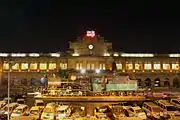 Night view of the station building
Night view of the station building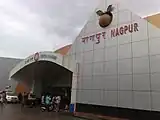 East-side entrance
East-side entrance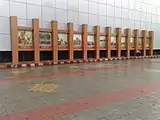 East-side station building
East-side station building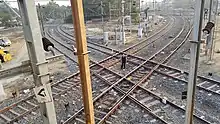 Diamond crossing near north side
Diamond crossing near north side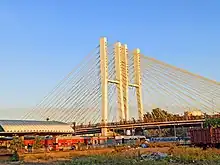 Ram Jhula
Ram Jhula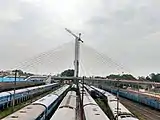 Ram jhula from FOB
Ram jhula from FOB Night view from FOB
Night view from FOB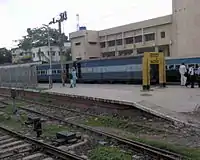 Narrow gauge platform (Decommissioned)
Narrow gauge platform (Decommissioned)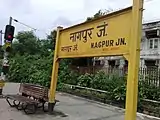 Station board
Station board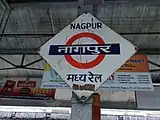 Platform board
Platform board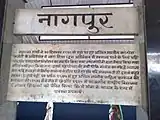 Info tablet at the station
Info tablet at the station Buland engine at the display
Buland engine at the display
References
- "Indian railway codes". Indian Railways. Retrieved 25 August 2018.
- "Brief about the division" (PDF).
- "Electrification History". Retrieved 31 March 2004.
- "Nagpur: Your railway station will soon look like this". The Times of India. 8 July 2022.
- "Division at a Glance: (as on 01.03.2019)". Central Railway. 3 January 2019.
- "90 years of Nagpur station Building".
- "Travel to Nagpur". mapsofindia.com. Archived from the original on 9 February 2011.
- "Geography: Railway Zones". IRFCA.
- "Station Brief" (PDF).
- "Nagpur to get model railway station". The Times of India. Archived from the original on 22 October 2012.
- "Salwa–Butibori (Chord Line)". maharail.com.
- Devanjana, Nag (11 September 2020). "Indian Railways Nagpur station to get a makeover! Heritage Conservation Committee approves redevelopment plan". The Financial Express. Financial Express. Retrieved 10 February 2021.
- "Passenger amenities" (PDF).
External links
- Nagpur Junction railway station at the India Rail Info
 Nagpur travel guide from Wikivoyage
Nagpur travel guide from Wikivoyage